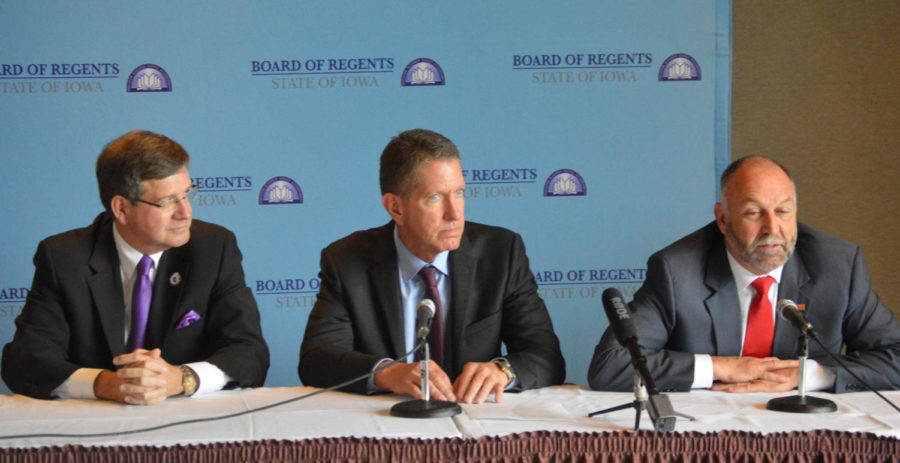Editorial: Proposed rate increases too difficult for students to take on
From left, UNI President Bill Ruud, Board of Regents President Bruce Rastetter and ISU President Steven Leath take questions from the media in the Scheman Building during the Board of Regents meeting on June 4.
February 17, 2016
Iowa State sent a proposal to the Iowa Board of Regents that proposed increases for most of the various housing, dining and parking rates at the university. The Regents will discuss the proposed increases at its meeting in Ames next Wednesday and Thursday.
Most of these proposed rate increases range between 2 and 4 percent and follow a tuition increase for this spring 2016 semester and an international student fees increase of $500 for the next three years. With the state’s already poor standing with student debt, it is discouraging to see the university wants to place an even higher burden on its students in all of these areas.
A college education, especially here in the state of Iowa, is simply getting too expensive for American citizens. Students in Iowa graduate with an average debt of more than $29,000, which is ranked eighth most in the country. Additionally, 68 percent of Iowa college students graduate with debt, according to the Institute for College Access and Success.
Iowa State ranks as the worst public university in the state for student debt upon graduation with an average of $28,880 in debt in 2014, according to the institute’s most recent data. Living expenses like housing, dining and parking would be a large portion of expenses when students go to college, so increasing these fees would only likely contribute to this debt.
The housing fees increase in particular put students in a difficult spot. For most room styles, the fee increase would range anywhere from about $100 to $300 for the more than 12,000 students who are expected to use university housing next year — which some students may simply be forced to pay because of a lack of other options.
City Council members have had conversations about Ames’ current housing shortage. The dramatic increase in enrollment in recent years has only made the problem worse. As a result, students are either forced to pay increasing rent prices of private companies — driven up by the shortage — or for university housing.
Additionally, all residence hall students, with the exception of those living in Wallace, are required to purchase a meal plan. Fees for most of meal plans and meal blocks are proposed to increase about 3 to 4 percent. Lastly, students with residence hall parking passes, which Iowa State requested to be raised 3.5 percent, would increase $5 to $148 per pass.
It is clear that some ISU students continue to struggle with paying for college. If these proposed fee increases become a reality, they would make a higher education that much more difficult to attain. Many students may not have a choice to pay these fees because of the housing shortage.
Because students are graduating with so much debt in Iowa, the state government should take more of a responsibility in supporting our public universities. This year, Gov. Terry Branstad allocated $8 million in his budget to the schools, significantly less than the requested $20.3 million in funding by the Board of Regents.
Obviously college graduates are essential to the success and progress of any state, so it is time for our government to think of other solutions to our college debt problem, rather than simply forcing students to pay more and start life out even farther behind financially.
Read the full list of proposed increased fees here.

















